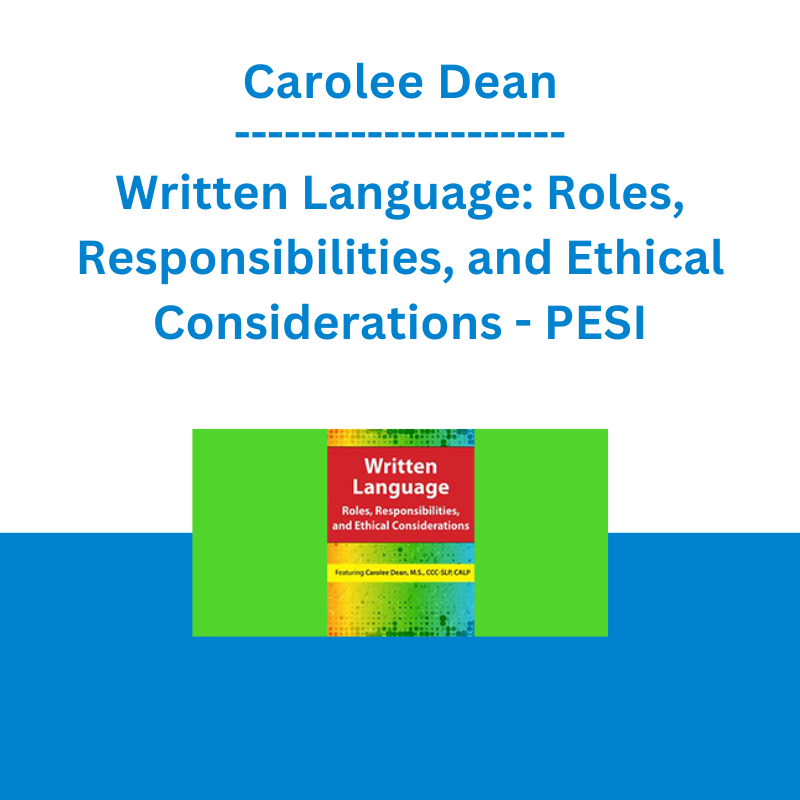*** Proof of Product ***
Exploring the Essential Features of “Carolee Dean – Written Language: Roles, Responsibilities, and Ethical Considerations – PESI”
Speaker: Carolee Dean, M.S., CCC-SLP, CALP
Duration: 2 Hours 02 Minutes
Format: Audio and Video
Copyright: Sep 28, 2020
Media Type: Digital Seminar
Description
Do you wonder, as an SLP, what your roles and responsibilities are to your students’ written language needs? Are you looking for ways to expand your knowledge and competence in this area? Would you like more information about the role that oral language plays in reading and writing?
Many students with communication disorders also have reading and writing disabilities (including dyslexia) or are at risk for developing them. School administrators and classroom teachers may not recognize the vital role SLPs play in literacy development. This session outlines the roles, responsibilities, and ethical considerations of SLPs in working with students with written language challenges and explains the relationship between oral and written language. It equips the SLP and other educators with evidence-based strategies for supporting students, empowers professionals to work together more collaboratively, and directs them to resources to further enhance their learning.
Speaker
Carolee Dean, M.S., CCC-SLP, CALP
Carolee Dean, M.S., CCC-SLP, CALT is a speech-language pathologist/teletherapist in private practice. She is also a Certified Academic Language Therapist and member of the Academic Language Therapy Association, an organization dedicated to the remediation of written language skills, including dyslexia. She is a past president of the Southwest Branch of the International Dyslexia Association and has created educational resources for teachers and SLPs including Story Frames for Teaching Literacy: Enhancing Student Learning Through the Power of Storytelling coming March 2021 with Brookes Publishing. She has resources available on her Teachers Pay Teachers Page (Carolee Dean at Word Travel LLC) and she is a frequent speaker at state and national conferences including ASHA and IDA. In addition, Dean is the award-winning author of the young adult novels, Comfort (Houghton Mifflin), Forget Me Not (Simon & Schuster), and Take Me There (Simon & Schuster), a YALSA Quick Pick for Reluctant Readers.
Speaker Disclosure:
Financial: Carolee Dean maintains a private practice. She is an author for Houghton Mifflin, Simon & Schuster, and Brookes Publishing and receives royalties. Ms. Dean receives a speaking honorarium from PESI, Inc. She has no relevant financial relationships with ineligible organizations.
Non-financial: Carolee Dean is a member of the American Speech-Language-Hearing Association; and the Academic Language Therapy Association (CALP).
Objectives
- Determine the roles, responsibilities, and ethical considerations of SLPs in regard to working with students with written language challenges.
- Assess risk factors for young children in developing reading and writing challenges.
- Articulate the relationship between oral language and written language.
- Employ evidence-based strategies for addressing written language through each of the components of language (phonology, morphology, syntax, semantics, and pragmatics).
- Build speech and language assessments that contribute to the understanding of a child’s written language challenges.
Outline
ASHA Code of Ethics – Specific Applications for Written Language Disorders
Roles and Responsibilities of Speech-Language Pathologists with Regard to Reading and Writing
- The connections between spoken and written language.
- How SLPs play a critical and direct role in the development of literacy.
Identifying Children at Risk and the Relationship Between Spoken Language and Literacy (Colenbrander et. al. 2018)
- Genetic factors
- Oral Language
- Phonemic awareness
- Letter knowledge
- Vocabulary knowledge
- Morphological awareness
- Hearing difficulties
- Speech sound disorders
- Other cognitive factors
The Role of the SLP in Assessing Reading and Writing
- Can SLPs diagnose dyslexia?
- Speech and Language Assessments
- Considering state and local standards
- What the new DSM-5 says about IQ testing
Using Evidence Bases Strategies to Target the Components of Spoken and Written Language
- Phonology
- Morphology
- Semantics
- Syntax
- Pragmatics and Discourse
Advancing the Knowledge Base
- Improve your own knowledge base (IDA Knowledge and practice standards, additional training).
- Provide knowledge and assistance to general education teachers, parents, and students
- Advocating for effective literacy practices in the school and district
Additional Professional and Ethical Considerations
- Determining your role on the literacy team, acknowledging the role of others
- Following state and local guidelines
- Promoting evidence-based practices
- Assessing gaps in your own knowledge and knowing where to go for information
Target Audience
- Speech-language pathologists working in the public schools grades K-12
- Speech-language pathologists in private practice
- Professionals working with SLPs
Please see the full list of alternative group-buy courses available here: https://lunacourse.com/shop/










 George Fontanills & Tom Gentile - Optionetics Wealth Without Worry Course
George Fontanills & Tom Gentile - Optionetics Wealth Without Worry Course  Julie Stoian & Cathy Olson - Launch Gorgeous - Funnel Gorgeous Bundle
Julie Stoian & Cathy Olson - Launch Gorgeous - Funnel Gorgeous Bundle  Trade Like Mike - The TLM Playbook 2022
Trade Like Mike - The TLM Playbook 2022  Dave Landry - Stock Selection Course
Dave Landry - Stock Selection Course  Crypto Dan - The Crypto Investing Blueprint To Financial Freedom By 2025
Crypto Dan - The Crypto Investing Blueprint To Financial Freedom By 2025  Matan Feldman - The 13-Week Cash Flow Modeling - Wall Street Prep
Matan Feldman - The 13-Week Cash Flow Modeling - Wall Street Prep